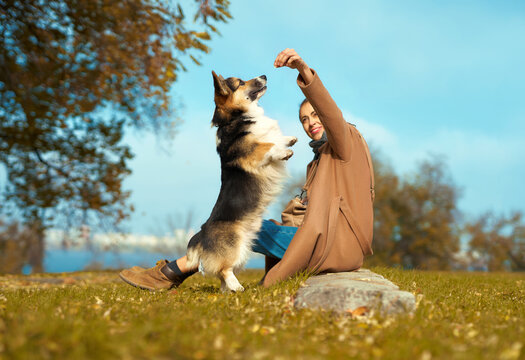Puppy Love: The Emotional Connection in Dog Ownership
It’s no secret that dogs are man’s best friend. But have you ever wondered why we form such deep emotional connections with our furry companions? The bond between a dog and their owner goes far beyond just a pet and their human. In this blog post, we delve into the fascinating world of dog ownership and explore the emotional connection that exists between dogs and their owners. Get ready to discover the secrets behind that special “puppy love” feeling that many of us experience with our beloved canine companions.

The Science Behind the Emotional Connection in Dog Ownership
Dog ownership has been associated with positive emotional benefits for decades. Recent studies reveal that the emotional connection between humans and their dogs is backed by science. Research shows that owning a dog increases serotonin, dopamine, and oxytocin levels – neurotransmitters responsible for feelings of happiness and love.
The bond between dogs and their owners is strengthened through physical touch, such as petting or playing fetch. This interaction releases endorphins in both humans and dogs, further enhancing the emotional connection.
But it’s not just about chemicals in our brains; the companionship offered by dogs can also alleviate symptoms of anxiety and depression. Owning a dog provides a sense of purpose, social support, and comfort during difficult times.
Overall, science suggests that dog ownership provides numerous mental health benefits to humans beyond simply having an animal companion. It’s important to nurture this emotional connection to reap these rewards fully.

How Dog Ownership Can Improve Your Mental Health
Dog ownership can have a profound impact on mental health. Studies have shown that interacting with animals, especially dogs, releases oxytocin in the brain which helps reduce stress and anxiety. In fact, owning a dog has been linked to lower levels of depression and increased feelings of happiness due to the companionship and affection they provide. Dogs also encourage physical activity through daily walks or playtime, which can improve overall well-being. Additionally, having a dog as a pet provides a sense of purpose and responsibility, helping individuals feel needed and valued. Overall, the emotional benefits of dog ownership cannot be understated and are worth considering for those looking to improve their mental health and quality of life.
The Importance of Building a Strong Bond with Your Dog
Building a strong bond with your dog is essential for a happy and fulfilling relationship. Consistency and patience are key when it comes to bonding with your furry friend. Spend quality time with your dog every day, whether it’s going for walks, playing fetch, or simply cuddling on the couch. Use positive reinforcement to reward good behavior and avoid punishment-based training methods that can damage the trust between you and your dog. Communication is also crucial in building a strong bond; learn to read your dog’s body language and vocal cues to better understand their needs and emotions. Remember that building a strong bond takes time, but the rewards of a loving and loyal companion are well worth the effort.
The Role of Training in Strengthening the Emotional Connection with Your Dog
The Importance of Positive Reinforcement in Dog Training
Positive reinforcement is a crucial aspect of dog training that can strengthen the emotional connection between you and your furry friend. Using rewards such as treats, praise, and playtime to reinforce good behavior encourages your dog to repeat those actions in the future. This creates a positive association with training and builds trust between you and your dog. Positive reinforcement also helps to establish clear communication and mutual understanding, which can lead to a deeper emotional bond. Consistency is key when using positive reinforcement, as it reinforces good behavior and discourages bad behavior without resorting to punishment or fear-based training methods.
Building Trust and Communication through Training Exercises
Training exercises play a crucial role in strengthening the emotional connection between dogs and their owners. Not only can proper training help prevent unwanted behaviors, but it also builds trust and communication. Positive reinforcement is key when it comes to effective training, as punishing your dog for bad behavior can damage your relationship with them. Instead, reward good behavior with treats or praise to reinforce positive actions. Consistency is also essential in successful training and building a strong emotional bond. By creating a routine of regular training sessions, you are not only establishing expectations for your dog but also providing an opportunity for quality time together that strengthens your overall relationship.
Using Training to Address Behavioral Issues and Strengthen the Bond
Training your dog not only helps address behavioral issues but also strengthens the emotional bond you share. Consistent training sessions using positive reinforcement techniques like treats and praise can create a sense of trust between you and your furry companion. It also establishes boundaries and routines that make them feel secure and cared for. Properly trained dogs feel more confident in their ability to please their owners, which leads to increased happiness on both ends of the leash. Through training, you teach your dog skills that they will use for life while building a deeper connection based on respect, communication, and mutual understanding.
The Role of Consistency in Maintaining a Strong Emotional Connection with Your Dog
Consistency in training is crucial in establishing a strong emotional connection with your dog. Using the same commands and positive reinforcement techniques every time enables you to communicate effectively with your pet, allowing them to better understand and trust you. Consistency also helps establish clear boundaries and expectations, which creates a sense of security for both owner and dog. When training, it’s important to remember that dogs thrive on routine, so make sure to set aside dedicated time each day for training sessions. This consistency will not only strengthen the bond between you and your furry friend but also foster good behavior and improve their overall well-being.

Understanding Your Dog’s Emotions: A Key to Successful Ownership
As a dog owner, it’s important to understand that dogs have emotions just like humans do. They can feel happy, sad, scared, and even jealous. By understanding your dog’s emotions, you can build a stronger bond with them and provide them with the care they need.
One important emotion to be aware of is anxiety. Dogs can experience anxiety in various situations such as separation from their owners or meeting new people. It’s important to recognize the signs of anxiety in your dog such as excessive barking or destructive behavior and take steps to help them feel more comfortable.
Another key emotion is happiness. Dogs show happiness through tail wagging, playful behavior, and cuddling with their owners. By providing your dog with plenty of love and attention, you can help them feel happy and content.
Overall, understanding your dog’s emotions is crucial for successful ownership. By being aware of their emotional needs and responding appropriately, you can build a strong and fulfilling relationship with your furry friend.

Overcoming Challenges in Dog Ownership: Tips for a Happy Relationship
Dog ownership can be a rewarding experience, but it also comes with its fair share of challenges. From potty training to dealing with destructive behavior, it’s important to approach these challenges with patience and understanding. One key to success is consistency in training and setting clear boundaries for your dog. Positive reinforcement is a powerful tool in shaping your dog’s behavior and strengthening your bond. It’s also important to provide plenty of mental and physical stimulation through exercise, playtime, and training activities. Additionally, communication is key in any relationship, including the one you have with your dog. Learning to read your dog’s body language and vocal cues can help you understand their needs and emotions better. Remember that every dog is unique, so be willing to adapt your approach as needed to ensure a happy and healthy relationship with your furry friend.
The Benefits of Owning a Dog: More Than Just Companionship
Benefits of owning a dog go way beyond just having a furry companion. Studies have shown that dog ownership can improve your physical health by reducing stress, lowering blood pressure and increasing exercise levels. In addition to the physical benefits, owning a dog can also be beneficial for mental health. Dogs are known to provide comfort and alleviate feelings of loneliness and anxiety, making them great therapy animals.
One key advantage of owning a dog is their ability to teach responsibility, particularly in children who learn how to take care of another living creature. This not only instills empathy but also develops self-discipline.
Moreover, dogs are excellent social magnets; they help break down barriers between people allowing for more engaging interactions with others. They have even been credited with being able to mitigate symptoms associated with autism in children by providing emotional support.
Overall, there’s no denying that dogs bring joy into our lives as well as provide numerous practical benefits for human well-being.

Nurturing Your Puppy’s Emotional Well-being: A Guide to Responsible Ownership
The Science Behind the Canine-Human Bond
Studies have shown that the emotional connection between humans and dogs is more than just a feeling – it’s a biological bond. When we interact with our furry friends, our brains release oxytocin, also known as the “love hormone”. Oxytocin plays a crucial role in nurturing social bonds, reducing stress, and promoting overall well-being. In fact, research has found that owning a dog can lower blood pressure and reduce anxiety levels. This means that nurturing your puppy’s emotional well-being isn’t just important for their happiness; it’s also essential for your own mental health. By providing love and care to your furry friend, you’re giving yourself an invaluable gift of companionship and unconditional love.
Understanding Your Puppy’s Emotional Needs
Understanding your puppy’s emotional needs is crucial in ensuring responsible dog ownership. Puppies are highly sensitive creatures that require a lot of social interaction and stimulation to develop into well-adjusted dogs. As an owner, you must pay attention to their body language and vocal cues to understand how they feel. Like humans, puppies can experience anxiety, fear, and stress, so it’s important to create a safe environment for them. Providing plenty of exercise and positive reinforcement training not only improves their physical health but also helps promote mental wellness. Remember that nurturing your puppy’s emotional well-being is key to building a happy lifelong relationship with your furry friend!
Building Trust and Strengthening your Relationship with your Pup
When it comes to dog ownership, building trust and strengthening the emotional connection with your pup is crucial for their well-being. This starts with consistent training that focuses on positive reinforcement rather than punishment. It’s important to establish boundaries and rules early on, but also show affection and praise when they follow them. Another key aspect is spending quality time together, whether it’s going for walks, playing games, or cuddling on the couch. This will not only deepen your bond but also provide mental stimulation for your furry friend. By nurturing their emotional needs, you can ensure a happy and healthy relationship with your pup for years to come.
Nurturing a Happy and Healthy Emotionally Intelligent Puppy
To ensure a happy and healthy emotionally intelligent puppy, it’s important to provide them with proper care and attention. Regular exercise, a balanced diet, and routine veterinary check-ups are crucial for their physical well-being. Additionally, socialization and positive reinforcement training can help them develop good behavior and emotional intelligence. Consistency in training and setting clear boundaries can also help your puppy feel secure and confident. Remember to give them plenty of love, attention, and playtime to strengthen the bond between you both. By nurturing your puppy’s emotional well-being, you can ensure a long-lasting and fulfilling relationship with your furry friend.

Celebrating the Unconditional Love and Loyalty of Dogs in Our Lives
Unconditional love and loyalty are two of the most beautiful qualities that dogs possess. They have an innate ability to sense our emotions and respond with empathy, providing comfort and support when we need it the most. As dog owners, we are blessed to experience this kind of affectionate bond that transcends words and lasts a lifetime.
Whether it’s the wagging tail, the wet nose, or the playful bark, dogs have a way of making us feel loved and appreciated. They are always there for us, no matter what, offering a listening ear or a warm cuddle when we need it.
As we celebrate the joy of dog ownership, let us also remember to cherish these precious moments with our furry friends. Let us take care of them with kindness and compassion, providing them with all the love and attention they deserve.
In return, they will continue to shower us with their unwavering devotion and loyalty, reminding us of the true meaning of unconditional love. So let’s raise a paw to our furry companions and thank them for being such an important part of our lives!
In conclusion, the emotional connection between humans and dogs is a powerful bond that has been scientifically proven to improve our mental health and overall well-being. Building a strong relationship with our furry friends requires effort, patience, and understanding of their emotions. Training plays an essential role in strengthening this bond while nurturing your puppy’s emotional wellbeing is crucial for responsible ownership.
Owning a dog comes with challenges but the benefits are immeasurable. Dogs offer more than just companionship; they are loyal protectors, exercise partners, and can even detect illnesses before it’s too late.
At [Shop Name], we understand the importance of providing quality care for your furry friend. We offer a wide range of nutritious food options, comfortable beds, toys that will keep them entertained for hours on end, grooming tools to help your pup look its best – everything you need to give your pet the love it deserves.
Visit us today and discover how we can help you build an unbreakable emotional connection with your four-legged family
Questions & Answers
Who should own a dog?
Anyone who can commit to providing care for their pet.
What are the benefits of dog ownership?
Dogs can provide companionship, security, and improve mental health.
How much time does owning a dog require?
It varies, but expect to spend at least 1-2 hours per day on care and exercise.
What if I don’t have a lot of space for a dog?
Small dogs or breeds that don’t require a lot of exercise may be a better fit.
How do I choose the right dog for me?
Consider your lifestyle, living situation, and preferences when selecting a breed.
What if I can’t afford the costs of dog ownership?
Look into low-cost veterinary clinics and consider adopting from a shelter to save on initial costs.




Leave a Reply